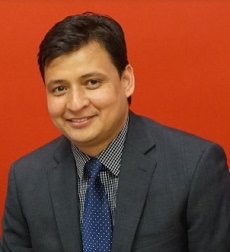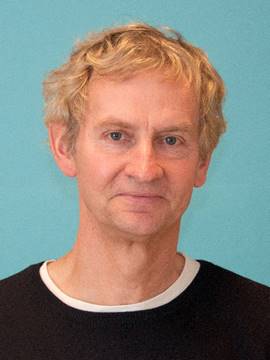Keynote Speakers
Prof. Paolo Rosso
Full Professor, Computer Science, Universitat Politècnica de València, SpainSpeech Title: Machine learning and intelligent systems for detecting fake news, hate speech and bots
Abstract: Social media have given the opportunity to users to publish content and express their opinions online in a fast and easy way. The ease of generating content online and the anonymity that social media provide have increased the amount of harmful content that is published. A great amount of fake news, hoaxes, hurtful comments, inaccurate reviews and offensive content is published and propagated every day in social media. Bots play also a key role in disseminating false claims and hate speech. In this keynote I will describe some of the machine learning based intelligent systems that address the problem of detecting harmful information, with special emphasis on fake news and hate speech. Moreover, I will describe some of the shared tasks that have been organised in our research community for instance at the PAN Lab, where given a Twitter feed, the aim has been to identify whether its author is a bot (2019), or s/he is keen to be a spreader of fake news (2020). At SemEval the HatEval shared task (2019) focused on identifying hate speech towards immigrants and women.
Biography: Paolo Rosso is full professor at the Universitat Politecnica de Valencia, Spain where he is also member of the PRHLT research center. His research interests focus mainly on author profiling, irony detection, fake reviews detection, plagiarism detection, and recently hate speech and fake news detection. Since 2009 he has been involved in the organisation of PAN benchmark activities at CLEF and at FIRE evaluation forums, mainly on plagiarism / text reuse detection and author profiling. At SemEval he has been co-organiser of shared tasks on sentiment analysis of figurative language in Twitter (2015), and on multilingual detection of hate speech against immigrants and women in Twitter (2019). He is co-ordinator of the activities of FIRE and IberEval evaluation forums. He has been PI of national and international research projects funded by EC and U.S. Army Research Office. At the moment, in collaboration with Carnegie Mellon University, he is involved in a project funded by Qatar National Research Fund on author profiling for cyber-security. He serves as deputy steering committee chair for the CLEF conference and as associate editor for the Information Processing & Management journal. He has been chair of *SEM-2015, and organisation chair of CERI-2012,CLEF-2013 and EACL-2017. He is the author of 400+ papers, published in journals, book chapters, conference and workshop proceedings.
Prof. Victor Chang
Teesside University, United KingdomSpeech Title: The Futuristic AI-based Data Science and Analytics with Examples
Abstract: Data Science is an interdisciplinary area between computing, mathematics, statistics, analytics, methods, machine learning, data processing and domain expertise. Mastering Data Science often will need to have clear understanding about the data, which methods suitable to deal with the research challenges, extract important results and explain fully and accordingly to the goals of research or business requirements. This keynote presents the Futuristic research outputs for AI–based Data Science and Analytics services and methods that can analyze multiple disciplines including healthcare, finance, data center computing, social networks, security and weather studies. In particular, research outputs from two disciplines will be at the center of attention. The presented examples may include first, health informatics, such as the studies of genes, cancers and human bodies. Second, the financial deep learning, risk modeling and financial computation and algorithms. Third, the weather studies of South Korea over a period of time. Summary of other contributions can be discussed. Real world examples can be given and demonstrated, so that the overall work can offer the Futuristic AI-based Data Science and Analytics Services with research contributions.
Biography: Prof. Victor Chang is currently a Full Professor of Data Science and Information Systems at the School of Computing, Engineering and Digital Technologies, Teesside University, Middlesbrough, UK, since September 2019. He was a Senior Associate Professor, Director of Ph.D. (June 2016- May 2018) and Director of MRes (Sep 2017 - Feb 2019) at International Business School Suzhou (IBSS), Xi’an Jiaotong-Liverpool University (XJTLU), Suzhou, China, between June 2016 and August 2019. He was also a very active and contributing key member at Research Institute of Big Data Analytics (RIBDA), XJTLU. He was an Honorary Associate Professor at University of Liverpool. Previously he was a Senior Lecturer at Leeds Beckett University, UK, between Sep 2012 and May 2016. Within 4 years, he completed Ph.D. (CS, Southampton) and PGCert (Higher Education, Fellow, Greenwich) while working for several projects at the same time. Before becoming an academic, he has achieved 97% on average in 27 IT certifications. He won a European Award on Cloud Migration in 2011, IEEE Outstanding Service Award in 2015, best papers in 2012, 2015 and 2018, the 2016 European special award and Outstanding Young Scientist 2017. He is a visiting scholar/Ph.D. examiner at several universities, an Editor-in-Chief of IJOCI & OJBD journals, former Editor of FGCS, Associate Editor of TII & Information Fusion, founding chair of two international workshops and founding Conference Chair of IoTBDS and COMPLEXIS since Year 2016. He is the founding Conference Chair for FEMIB since Year 2019. He published 3 books as sole authors and the editor of 2 books on Cloud Computing and related technologies. He gave 18 keynotes at international conferences. He is widely regarded as one of the most active and influential young scientist and expert in IoT/Data Science/Cloud/security/AI/IS, as he has experience to develop 10 different services for multiple disciplines.
Prof. Danda B. Rawat
Professor, Department of Electrical Engineering & Computer ScienceFounder and Director, Data Science & Cybersecurity Center
Graduate Program Director, Howard-CS Graduate Programs
Director, Cybersecurity & Wireless Networking Innovations (CWiNs) Lab
Howard University, Washington, DC, 20059, USA.
Speech Title: Machine Learning and Artificial Intelligence for Emerging Systems and Applications: The Triumph and Tribulation
Abstract: Machine Learning (ML) algorithms and Artificial Intelligence (AI) systems have been shown to be able to create machine cognition comparable to or even better than human cognition for some applications. Machine learning algorithms are now regarded as very useful cybersecurity solutions for different emerging applications. However, because ML algorithms and AI systems can be controlled, dodged, biased, and misled through flawed learning models and input data, they need robust security features and trustworthy AI. It is very important to design and evaluate/test ML algorithms and AI systems that produce reliable, robust, trustworthy, explainable and fair/unbiased outcomes to make them acceptable by diverse users. The keynote covers applications and use cases of secure and trustworthy ML/AI and their success and pitfalls.
Biography: Dr. Danda B. Rawat is a Full Professor in the Department of Electrical Engineering & Computer Science (EECS), Founder and Director of the Howard University Data Science and Cybersecurity Center, Director of Cyber-security and Wireless Networking Innovations (CWiNs) Research Lab, Graduate Program Director of Howard CS Graduate Programs and Director of Graduate Cybersecurity Certificate Program at Howard University, Washington, DC, USA. Dr. Rawat is engaged in research and teaching in the areas of cybersecurity, machine learning, big data analytics and wireless networking for emerging networked systems including cyber-physical systems, Internet-of-Things, multi domain battle, smart cities, software defined systems and vehicular networks. His professional career comprises more than 18 years in academia, government, and industry. He has secured over $16 million in research funding from the US National Science Foundation (NSF), US Department of Homeland Security (DHS), US National Security Agency (NSA), US Department of Energy, National Nuclear Security Administration (NNSA), DoD and DoD Research Labs, Industry (Microsoft, Intel, etc.) and private Foundations. Dr. Rawat is the recipient of NSF CAREER Award in 2016, Department of Homeland Security (DHS) Scientific Leadership Award in 2017, Researcher Exemplar Award 2019 and Graduate Faculty Exemplar Award 2019 from Howard University, the US Air Force Research Laboratory (AFRL) Summer Faculty Visiting Fellowship in 2017, Outstanding Research Faculty Award (Award for Excellence in Scholarly Activity) at GSU in 2015, the Best Paper Awards (IEEE CCNC, IEEE ICII, BWCA) and Outstanding PhD Researcher Award in 2009. He has delivered over 20 Keynotes and invited speeches at international conferences and workshops. Dr. Rawat has published over 200 scientific/technical articles and 10 books. He has been serving as an Editor/Guest Editor for over 50 international journals including the Associate Editor of IEEE Transactions of Service Computing, Editor of IEEE Internet of Things Journal, Associate Editor of IEEE Transactions of Network Science and Engineering and Technical Editors of IEEE Network. He has been in Organizing Committees for several IEEE flagship conferences such as IEEE INFOCOM, IEEE CNS, IEEE ICC, IEEE GLOBECOM and so on. He served as a technical program committee (TPC) member for several international conferences including IEEE INFOCOM, IEEE GLOBECOM, IEEE CCNC, IEEE GreenCom, IEEE ICC, IEEE WCNC and IEEE VTC conferences. He served as a Vice Chair of the Executive Committee of the IEEE Savannah Section from 2013 to 2017. Dr. Rawat received the Ph.D. degree from Old Dominion University, Norfolk, Virginia. Dr. Rawat is a Senior Member of IEEE and ACM, a member of ASEE and AAAS, and a Fellow of the Institution of Engineering and Technology (IET).
Prof. Jan Treur
Social AI Group, Vrije Universiteit Amsterdam, NetherlandsSpeech Title: Modeling Multi-Order Adaptive Processes by Self-Modeling Networks
Abstract: This talk addresses the use of self-modeling networks to model adaptive biological, mental and social processes of any order of adaptation. A self-modeling network for some base network is a network extension that represents part of the base network structure by a self-model in terms of added network nodes and connections for them. A network structure in general involves network characteristics for connectivity (connections between nodes), aggregation (combining multiple incoming impacts on a node) and timing (node state dynamics speed). By representing some of these network characteristics by a self-model using dynamic node states, these characteristics become adaptive. By iterating this construction, multi-order network adaptation is easily obtained. A dedicated software environment for self-modeling networks that has been developed supports the modeling and simulation processes. This will be illustrated for some application domains, for example, for Cognitive Neuroscience by a second-order adaptive network model to model plasticity of connections and node excitability, and metaplasticity to control such plasticity.
More details, kindly refer to 'Modeling Multi-Order Adaptive Processes by Self-Modeling Networks'
Biography: Jan Treur works as a full professor in Artificial Intelligence. He is an internationally well-recognized expert in human-directed AI and cognitive and social modelling. The research of Jan Treur during the past 10 years concerns both fundamental and application-directed aspects of human-directed AI. This covers methods and techniques for modelling and analysis of human-directed AI approaches in a number of application areas, including Cognitive and Social modelling and simulation. He has been and still is active both by author and PC member roles in practically all relevant conferences and journals in these AI and application areas. Currently his research has mostly a multidisciplinary focus and addresses Network-Oriented Modeling approaches based on adaptive temporal-causal networks to model cognitive, affective and social interactions, with two books about this published in 2016 and 2020. Applications cover multi-order adaptive network models for mental and social simulation and human-aware or socially aware AI systems and virtual agents. More details can be found at URL https://www.researchgate.net/profile/Jan_Treur.




